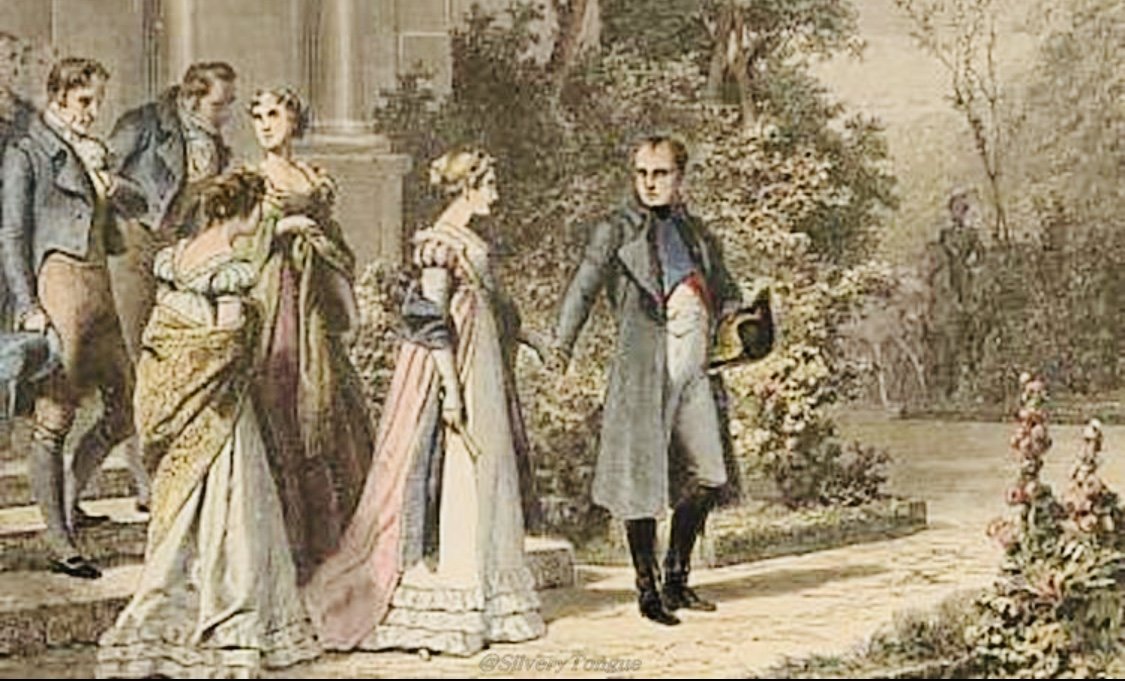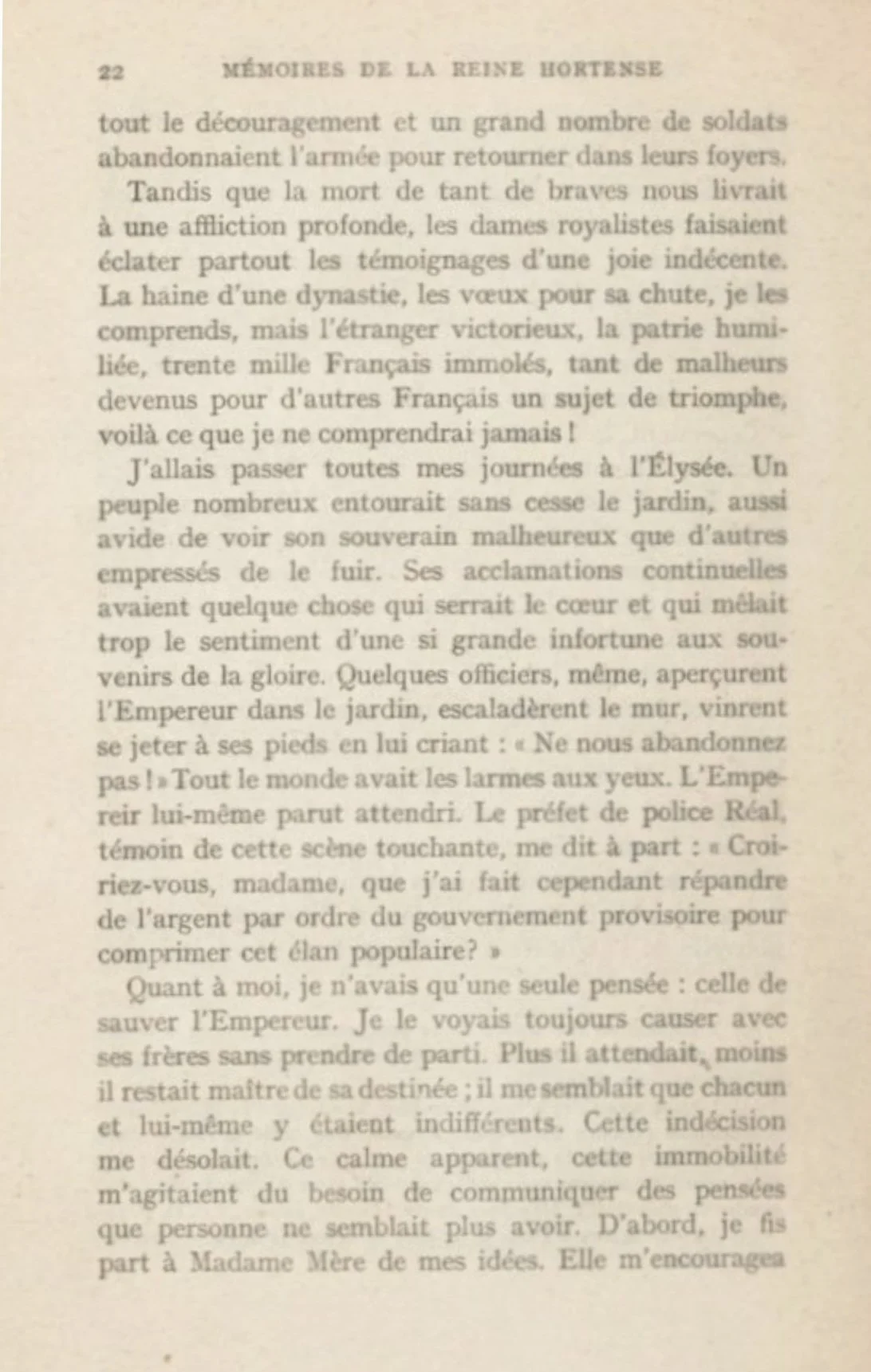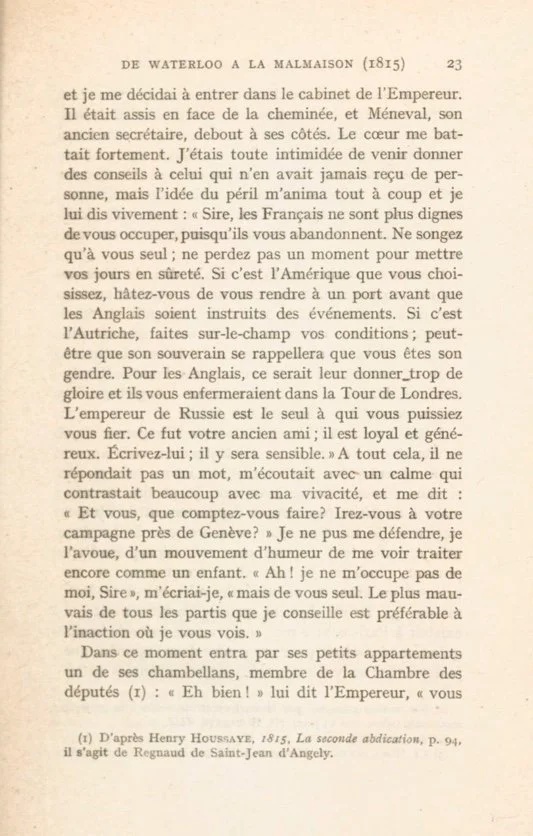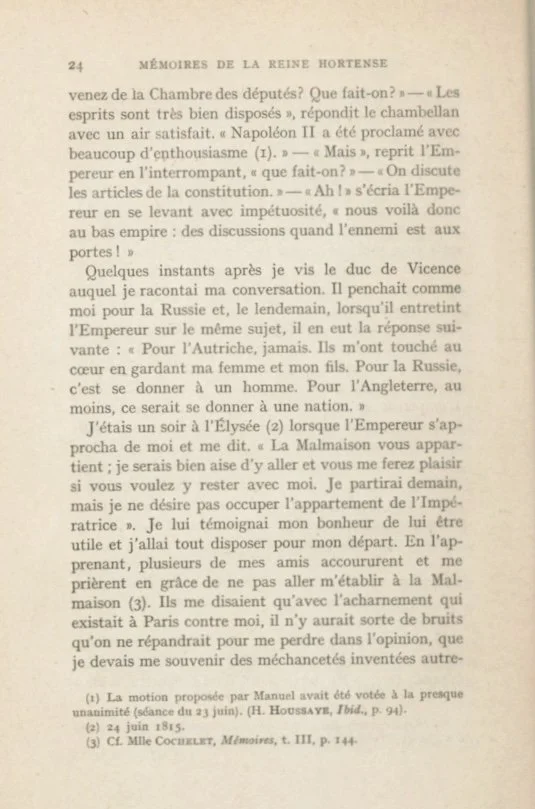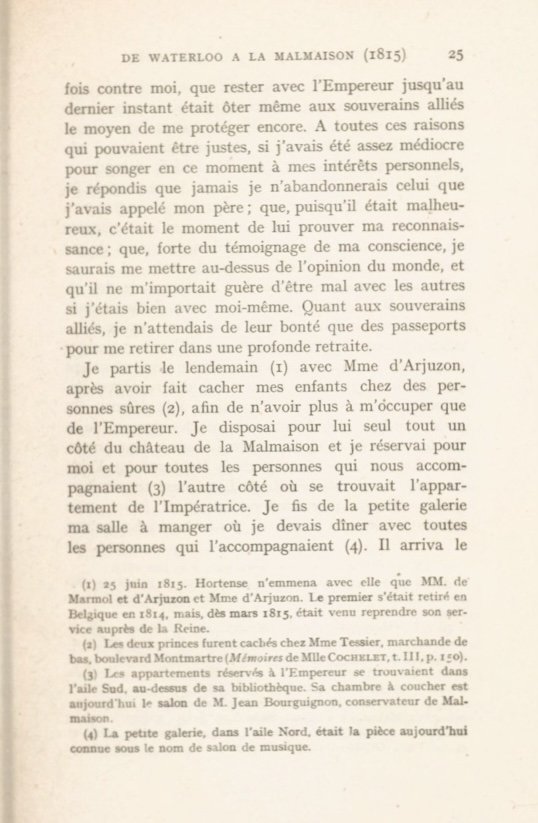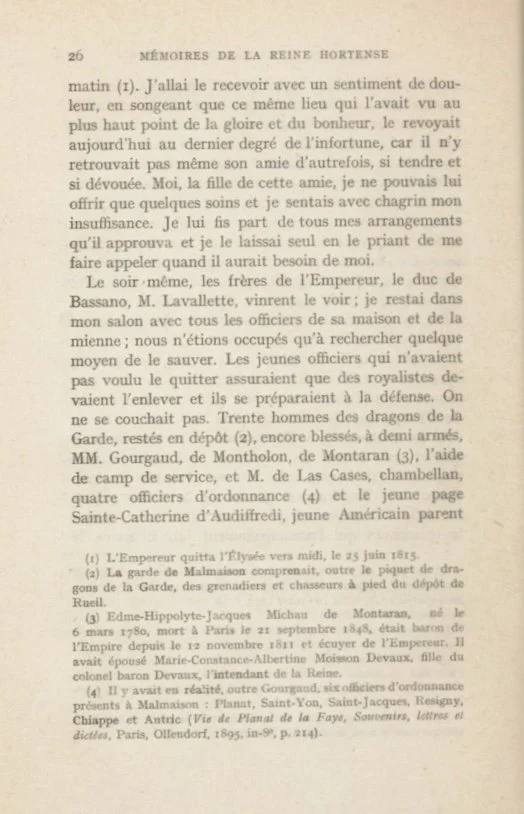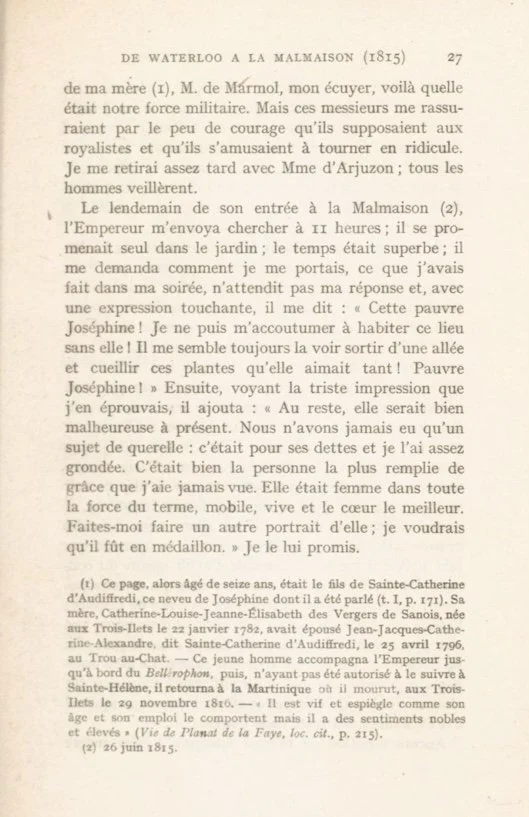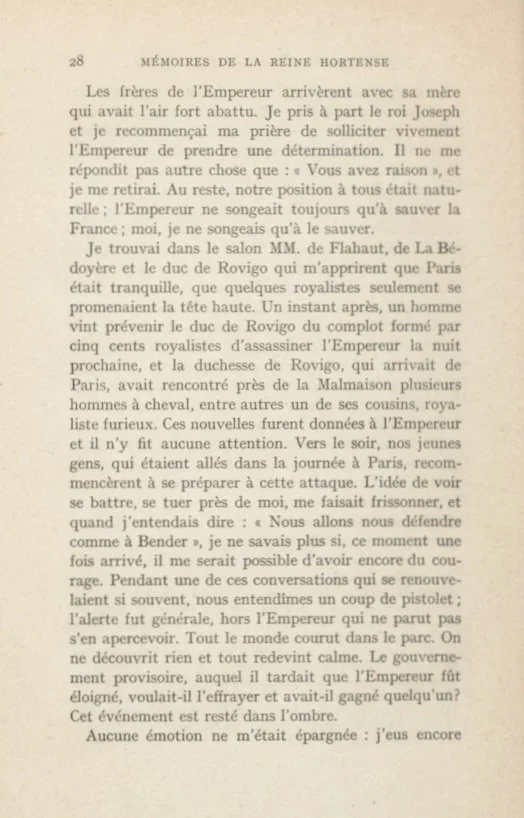Let’s have another look at Hortense’s Memoirs. If you want to read the book it is available for free at the side bar in English and French. Use the widget on the sidebar to translate the text below into pretty much any language.
This is to show the tricks that are played to subvert a nation’s sovereignty. You can identify this group by the fact that their tactics are so predictable at this point. It’s important to identify the ones secretly working for the spy system because they are very dangerous to their targets.
The passage below demonstrates how after many ups and downs, Hortense adored Napoleon and was extremely preoccupied with his well-being.
Hortense’s memoirs continues:
At this moment one of his chamberlains, a member of the Chamber of Deputies, came in through 'the private apartments. "Well," said the Emperor, "you have just left the Chamber of Deputies? What is happening there?"
“The attitude of the members is a thoroughly satisfactory one," replied the chamberlain with a satisfied air.
“Napoleon II has been proclaimed amid much enthusiasm."
“But," interrupted the Emperor, "what is being done?"
“The articles of the constitution are being discussed." "Ah," exclaimed the Emperor, rising abruptly, "we have gone back to the days of Byzantium. People stop to discuss when the enemy is at the gates."
A few minutes later I saw the Duc de Vicence, to whom I related my conversation. He shared my preference for Russia, and the next day when speaking to the Emperor about the same subject, he received the following answer:
“Austria, never. They wounded me too deeply by keeping my wife and my son. To surrender to Russia is to make myself the prisoner of a man to surrender to England is to surrender to a nation."
One evening I was at the Elysée when the Emperor came up to me and said "Malmaison belongs to you. I should enjoy going there and I should be pleased if you would stay there with me. I shall leave tomorrow to go there, but I do not wish to occupy the Empress's suite."
I expressed my pleasure at being able to be useful to him and I made all arrangements for my departure. When several of my friends heard the news, they came and begged me not to go and settle at Malmaison.
They declared that, with the violent animosity certain people felt toward me in Paris, there would be all sorts of rumors spread to influence public opinion against me. Nor must I forget the malicious gossip of which I had previously been made the object.
To remain with the Emperor up to the last moment was to prevent even the allied monarchs from being able to continue their protection of me.
All these arguments might have influenced me if I had been sufficiently petty to stop and consider my private interests. I replied that I would never abandon the man whom I had considered as my father, that now in his hour of misfortune I could best prove my gratitude, that since my conscience was clear I should feel myself above the criticism of society.
It did not matter if others were dissatisfied with my conduct so long as I personally was pleased with it. As for the foreign kings, the only things I hoped from them were passports which would allow me to retire to some far-away, secluded spot.
The next morning, I left accompanied by Madame d'Arjuzon, having concealed my children in the house of a person whom I could trust in order to be able to devote all my attention to the Emperor.
I reserved one wing of the château for him and I kept the other containing the Empress's apartment for me and my attendants. I made the small gallery into a dining-room where we and our suite were to have dinner.
The Emperor arrived in the morning. I felt sad when I went to receive him to think how this place which he had visited when at the height of his success and fame now again received him reduced to the last stage of wretchedness, since he was deprived even of the presence of his former devoted and affectionate companion.
I, the daughter of that companion, was able to offer him only a slight comfort in his sorrow, and I was conscious of all I lacked. I informed him of all the measures I had taken to insure his comfort. He approved of them. Then I left him by himself, asking him to summon me when he might happen to desire my company.
That evening the Emperor's brothers and the Duc de Bassano and Monsieur Lavallette came out to see us. I remained in the drawing-room with all the officers belonging to my household and that of the Emperor.
Our only topic of conversation, the only thing we thought about, was how to save him. The young officers who had accompanied him assured us that the royalists were going to try to kidnap him.
They prepared to defend him as best they might. Nobody went to bed. Thirty men from the dragoon regiments who had remained at the near-by replacement camp on account of their wounds and were not properly armed, Monsieur Gourgaud, Monsieur de Montholon, Monsieur de Montaran, four orderlies, the aide-de-camp who was on duty, Monsieur de Las Cases the chamberlain, a young page Sainte-Catherine d'Audiffredi, a young American who was a relative of my mother, and my equerry Monsieur de Marmol, were all the force we could muster in the way of a defense.
These gentlemen, however, managed to reassure me by the opinion they had of the royalists' courage, which they were continually making fun of. I retired late accompanied by Madame d'Arjuzon.
All the men stayed awake. The morning following his arrival at Malmaison the Emperor sent for me about eleven o'clock. He was walking alone in the gardens. The weather was magnificent. He inquired about my health and asked what I had done the night before, but did not wait for a reply and continued: "Poor Josephine! I cannot become accustomed to this place without her. It always seems as though I were going to catch sight of her behind the next hedge, picking the flowers she loved so dearly. Poor Josephine!"
Noting how this topic depressed me he added "It is true she would be very sad if she could see the way things are going at present. There was only one subject we ever disagreed about, her debts. How I used to scold her about them! She was certainly the most charming person I have ever known. She was a true woman with all the qualities that word conveys, quick, lively and so good-hearted. Have another portrait made of her for me. I want it as a medallion."
I promised to have this done. The Emperor's brothers and his mother arrived together. The latter seemed greatly downcast. I called King Joseph aside and again began to plead with him for the Emperor to decide on some line of action.
All he was willing to say was, "You are right." I finally withdrew. Our attitude was natural enough, all things considered, the Emperor's one thought being to save France and mine to save him. In the drawing-room I found Monsieur de Flahaut, Monsieur de La Bedoyère and the Duc de Rovigo, who informed me that in Paris only a few royalists had dared show themselves. A moment later a man arrived to inform the Duc de Rovigo of the plot formed by five hundred royalists to murder the Emperor that night. The Duchesse de Rovigo also appeared.
On the way to Malmaison she had met several men on horseback, among them one of her cousins who was a notorious royalist. This news was passed on to the Emperor. He paid no attention to it.
The original French is available below:

